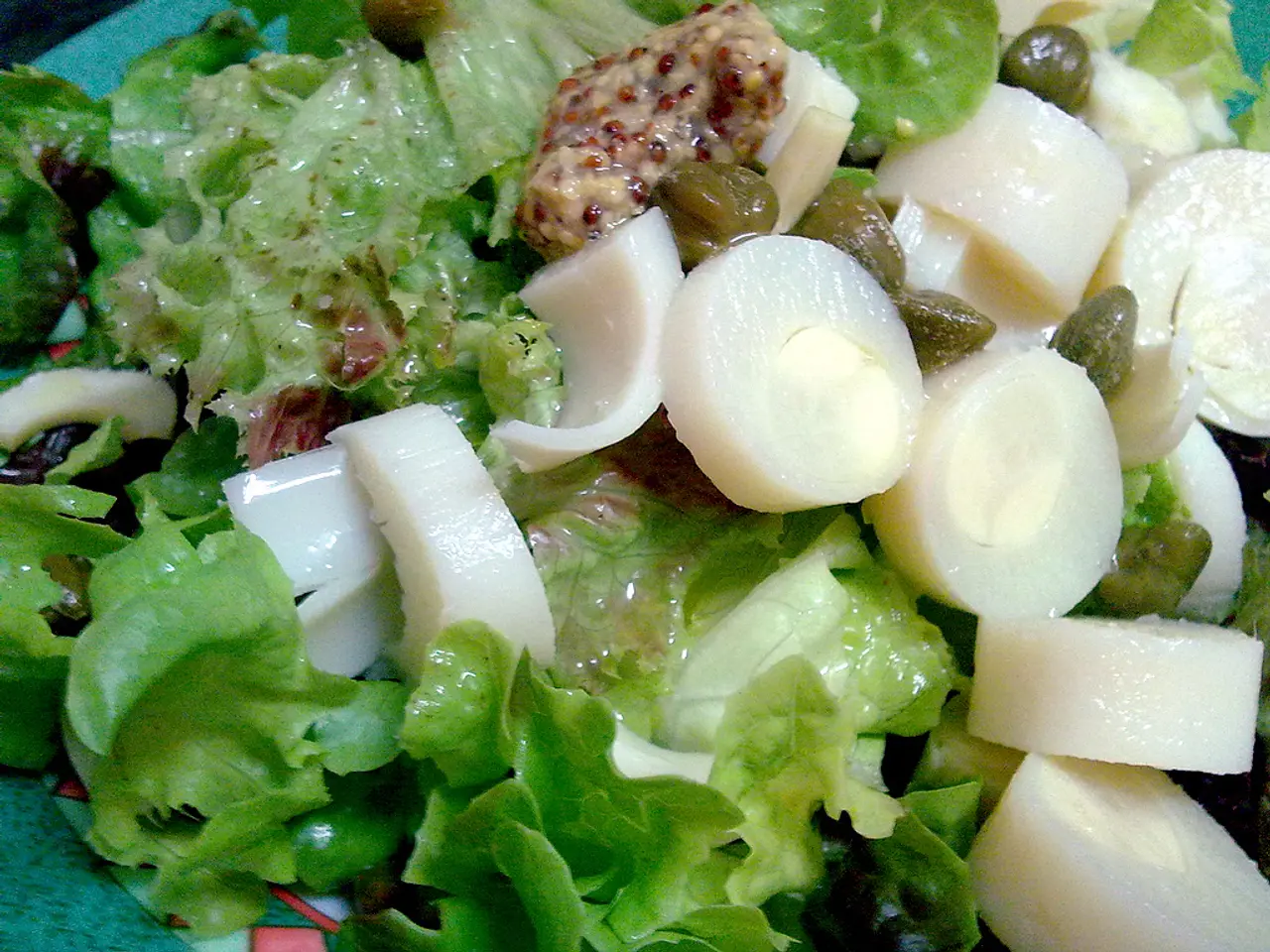Experiment with Homemade Chemistry in Salad Dressing Preparation
In the world of culinary delights, one ingredient often takes a backseat but plays a crucial role in many dishes - mustard. This humble condiment is not just a flavour enhancer, but also an emulsifier, a substance that helps combine two liquids that wouldn't normally mix.
To create a successful emulsion, an emulsifier and force are required. Whisking is used as force to break apart oil into tiny particles that can be suspended in vinegar, creating a smooth salad dressing. Mustard, with its unique properties, acts as an emulsifier, helping combine oil and vinegar in a salad dressing.
Mustard contains compounds that reduce the surface tension between oil and vinegar, enabling tiny oil droplets to disperse evenly throughout the vinegar. This prevents separation and creates a stable emulsion. Mustard molecules have both hydrophilic (water-attracting) and lipophilic (oil-attracting) properties. This dual affinity lets mustard anchor at the interface between the oil and vinegar phases, helping to keep the oil droplets suspended in the vinegar rather than coalescing and separating out.
The process typically involves whisking or shaking oil slowly into vinegar with mustard incorporated, which helps form smaller oil droplets and stabilizes the emulsion. Without an emulsifier, the dressing separates quickly, as oil and vinegar layer based on density differences. Thus, mustard acts as a natural emulsifier essential for creating a stable oil-in-water emulsion in vinaigrettes.
Emulsification is a process that combines two liquids which can't dissolve in each other to form a liquid mixture (emulsion). This process can be observed using a clear glass or jar with a lid, a whisk, vinegar, oil, and mustard. It's a fun and educational science experiment that can be done at home with simple kitchen ingredients.
Mustard isn't just limited to salad dressings. It can also be used in other oil and water experiments, such as making a homemade lava lamp with oil, water, and alka seltzer tablets, and making a density tower. Other emulsifiers that can be used in salad dressing include egg yolk, mayonnaise, tomato paste, and honey. Emulsifiers are also used in other foods like sauces, gums, chocolate, and ice cream to hold ingredients together and give food a soft and smooth texture.
For those interested in exploring more about emulsification, there are printable science projects for kids available. These projects include over 300 pages of classic science activities, best science practices posters, a Be a Collector activities pack, a Know the Words Science vocabulary pack, My science journal writing prompts, a Bonus STEAM Project Pack, and Bonus Quick Grab Packs for Biology, Earth Science, Chemistry, and Physics.
So, the next time you're about to whisk up a salad dressing, remember the unsung hero - mustard. Its emulsifying abilities not only make your dressing smooth and stable but also add a delightful flavour to your salad.
- Mustard, beyond its role in enhancing flavors, acts as an emulsifier in various projects, combining oil and vinegar effectively.
- The unique compound properties of mustard enable it to reduce the surface tension between oil and vinegar, creating a stable emulsion.
- Engage kids in fun and educational activities by demonstrating the emulsification process using mustard, oil, and vinegar.
- By whisking or shaking oil slowly into vinegar with mustard incorporated, a stable oil-in-water emulsion, like a vinaigrette, can be achieved.
- Emulsification isn't limited to salad dressings; it's also useful in art projects, play activities, and fitness-and-exercise equipment.
- Mustard's emulsifying capabilities extend to other oil and water experiments, such as homemade lava lamps and density towers.
- Education-and-self-development resources for emulsification include printable science projects for kids, catering to various subjects like Biology, Earth Science, Chemistry, and Physics.
- Emulsifiers like mustard not only improve the texture and stability of food but also contribute significantly to health-and-wellness by aiding digestion.
- Personal-growth can be accompanied by continuous learning, as understanding the science behind emulsification leads to a deeper appreciation for the simple, yet crucial, condiment – mustard.




